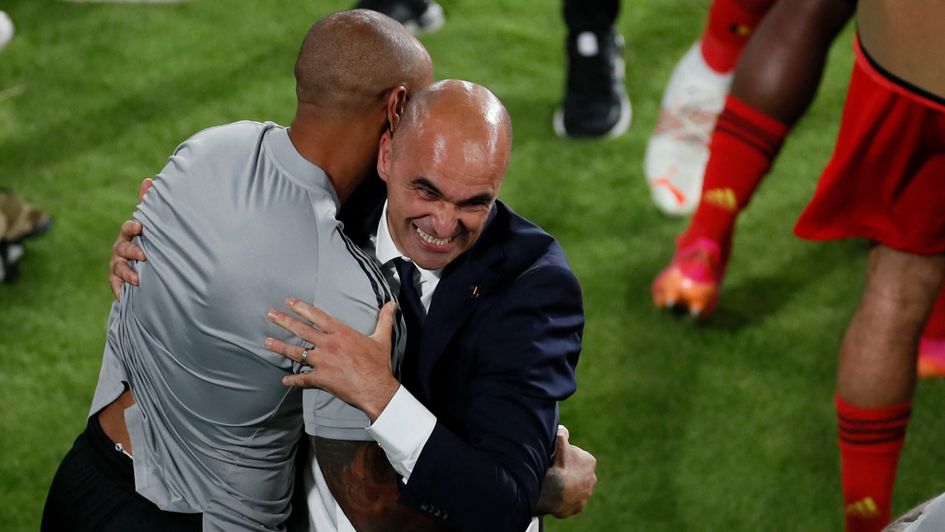The ‘golden generation’ tag can burden as much as it blesses. England found that out to their cost in the mid-2000s and until recently it seemed Belgium would be next to buckle under the pressure that comes with producing a group of such talent.
With each win at Euro 2020, though, they are turning potential into something material.
While Belgium had impressed in the group stage, there was a sense that the true measure of Roberto Martinez’s side wouldn’t be taken until they faced a high calibre opponent.
Portugal were that high calibre opponent and Belgium’s measure has been taken - they stand as tall as anyone else at this tournament.
Martinez proving his managerial worth
Belgium have played better at this summers Euros than they did against Portugal, but the way Martinez’s side held the defending champions at arm’s length for much of the 90 minutes revealed a lot about what the Spanish coach has built.
Seen by some as a weak link for Belgium, Martinez is now proving himself as one of the best in the international game.
Indeed, this Belgian team is more than the sum of its parts, which is saying something given the talent of their individuals.
Martinez has devised a system that harnesses the likes of Romelu Lukaku, Kevin De Bruyne and Eden Hazard while maintaining the structure of the side through Youri Tielemens, Axel Witsel and the use of wing-backs.
Even when injury forced De Bruyne off early in the first half, Belgium kept their shape.
In the heat of Andalusia, Martinez eased off on the high press, but asked his players to close down intelligently and make the ball do the work as often as possible. Even with Portugal chasing a late goal, it was positional discipline, not energy-sapping hard running, that got Belgium over the line.
Martinez should be praised for Hazard goal
Thorgan Hazard played his part, making more tackles (five) than anyone else, and netting the winner.
The way he fired in from 20 yards was similar to how De Bruyne found the back of the net against Denmark in the group stage.
Denmark also boast a defence that only looks vulnerable when forced to move across and so it seems the quick shift of play from right to left, like the one that preceded both De Bruyne and Hazard’s stunners, was designed by Belgium to expose a weakness in the opposition.
Belgium stand up to physical Portugal
Most managers with the attacking talent of Fernando Santos might have adopted a more expansive approach after falling a goal behind, but the Portugal boss’ immediate response to Hazard’s opener was to lean even more so into the physical, disruptive game plan that had proved ineffective up until then.
It wasn’t until the introduction of Bruno Fernandes and Joao Felix on the hour mark that Portugal started to play with more attacking verve.
With Felix (who registered three shots in 35 minutes) in the number 10 role and Fernandes moving forward on the right, the defending champions were able to establish a territorial and possession platform higher up the pitch (Fernandes made two key passes - only Cristiano Ronaldo and Diogo Jota made more).
This ploy came with significant risk, though, such is Belgium’s threat on the rapid counter attack. Santos’ original game plan appeared to be devised to prevent the Red Devils from turning into space. With the match running away from them, Portugal had no choice but to concede this space in order to exploit some across the frontline themselves.
Portugal attempted to overload the Belgium defence with a six-man attack that included centre forward Andre Silva after his introduction off the bench. Ruben Dias, Raphael Guerreiro and Felix all had chances as Belgium allowed some sloppiness into their game, but there was to be no equaliser.
Five years ago in France, Santos’ conservative approach masked the deficiencies in his squad. Here, though, the 66-year-old had the squad to do more. No Portuguese player registered more than one shot on target against Belgium as the Selecao failed to translate their greater share of possession into anything meaningful.
In some ways, this could also be considered Portugal’s ‘golden generation,’ superseding their team of the late 1990s and early 2000s, such is the strength of their current crop.
But while Portugal already have silverware to distinguish their ‘golden generation,’ Belgium are still chasing their own fulfilment.
It now feels closer than ever before.
